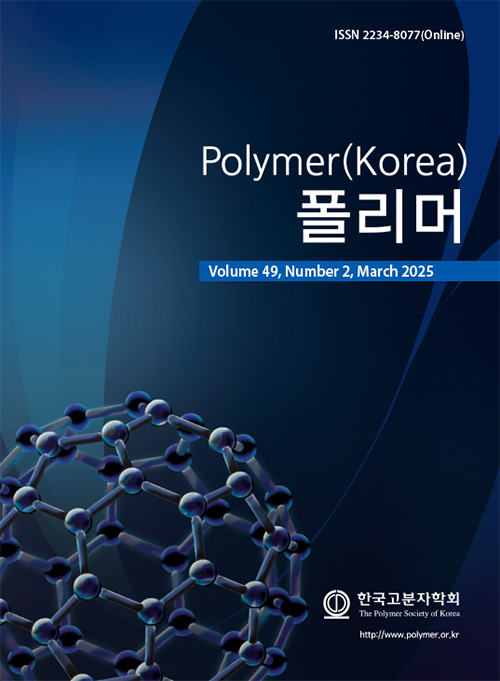- [Communication]
- Development of Novel Collagen Stimulator Based on Polycaprolactone-poly(ethylene glycol)-polycaprolactone Block Copolymer
Hyeon Jin Jeon*, **,†
 , Woo Sung Lee*, Hak Jin Song*, and Hyung Joo Kim**
, Woo Sung Lee*, Hak Jin Song*, and Hyung Joo Kim***R&D Ceneter, ROSELAB Inc, 209 Bongeunsa-ro, Gangnam-gu, Seoul 06109, Korea
**Department of Biological Engineering, Konkuk University, 120 Neungdong-ro, Gwangjin-gu, Seoul 05029, Korea- 폴리카프로락톤-폴리에틸렌글리콜-폴리 카프로락톤 삼중 블록 공중합체 소재 콜라겐 생성 촉진제 개발
*㈜로즈랩, R&D센터
**건국대학교 생물공학과Reproduction, stored in a retrieval system, or transmitted in any form of any part of this publication is permitted only by written permission from the Polymer Society of Korea.
We synthesized the triblock copolymers consisting of poly(ethylene glycol) (PEG) (Mn 4000 g/mole) and polycaprolactone (PCL) by ring-opening polymerization of ε-caprolactone with poly(ethylene glycol) as an initiator the stannous octoate. The 20 wt% aqueous solution of PCL-PEG-PCL triblock copolymer was exhibited a size of approximately 314 nm by DLS. To confirm the in vivo neocollagenesis, we observed the collagen fiber density in the dermis of Sprague-Dawly (SD) rat after injection of 20 wt% aqueous solution of the PCL-PEG-PCL triblock copolymer. we observed the collagen fiber density was 12% higher in the 8-week group compared to the PBS-injection control group. Furthermore, we confirmed that the presence of injected PCL-PEG-PCL particle at 1 week. In this study, we evaluated in vivo biodegradability and neocollagenesis ability of synthesized triblock copolymer and confirmed the possibility as the collagen stimulator.
평균분자량 4000 g/mole 폴리에틸렌글리콜(PEG)와 폴리카프로락톤(PCL)으로 구성된 PCL-PEG-PCL 삼중 블록 공중합체를 주석산화합물의 존재 하에서 개환중합을 통해 합성하였다. 20 wt% 수용액 상태의 PCL-PEG-PCL 삼중 블록 공중합체는 동적광산란으로 분석한 결과, 입자는 약 314 nm임을 확인하였다. 콜라겐 재생성을 확인하기 위하여 20 wt% 공중합체 용액을 Sprague-Dawly(SD) 랫드의 피내에 주입한 결과, 투여 8주차에 콜라겐 섬유 밀도가 인산완충 생리식염수 투여군보다 12% 더 높았으며 투여 1주 후에는 잔존 물질이 확인되었으나 투여 2주 이후에는 잔존 물질이 관찰되지 않았다. 본 연구에서는 삼중블록 공중합체를 합성하여 피내에 투여하여 생분해와 콜라겐 재생성을 평가하였고, 콜라겐 생성 촉진제로의 가능성을 확인하였다.
Keywords: copolymer, dermal filler, pegylation, polycaprolactone, poly(ethylene glycol).
- Polymer(Korea) 폴리머
- Frequency : Bimonthly(odd)
ISSN 2234-8077(Online)
Abbr. Polym. Korea - 2024 Impact Factor : 0.6
- Indexed in SCIE
 This Article
This Article
-
2025; 49(2): 159-162
Published online Mar 25, 2025
- 10.7317/pk.2025.49.2.159
- Received on Nov 20, 2024
- Revised on Jan 15, 2025
- Accepted on Jan 21, 2025
 Correspondence to
Correspondence to
- Hyeon Jin Jeon
-
*R&D Ceneter, ROSELAB Inc, 209 Bongeunsa-ro, Gangnam-gu, Seoul 06109, Korea
**Department of Biological Engineering, Konkuk University, 120 Neungdong-ro, Gwangjin-gu, Seoul 05029, Korea - E-mail: jhjwell@roselab.co.kr








 Copyright(c) The Polymer Society of Korea. All right reserved.
Copyright(c) The Polymer Society of Korea. All right reserved.